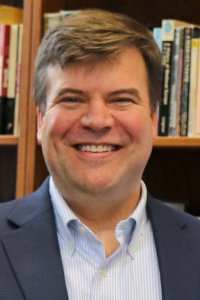Rooting For Answers
Ohio Wesleyan Professor Contributes to New Plant-Gravity Research Published in Nature Plants Journal

DELAWARE, Ohio – Ideas sowed by Ohio Wesleyan University professor Chris Wolverton more than a decade ago have contributed to a group of international scientists making breakthroughs in understanding how plant roots respond to gravity.
Their work, published in the latest edition of the online journal Nature Plants, ultimately could help to ensure a more sustainable food supply for the world.
In their research briefing, the scientists state, “By identifying the molecular basis of gravity-dependent non-vertical growth, our work provides the exciting possibility of new tools for the targeted manipulation of root system architecture to reduce reliance on environmentally damaging synthetic fertilizer and irrigation, thereby increasing the sustainability of crop production.”
“It’s a huge paper with incredible science,” said Wolverton, Ph.D., whose plant research has twice earned NASA research grants and also has been conducted on the International Space Station. “My data was only a small part, but I’m still thrilled to be part of such important research.”
The work, he said, “took a new and exciting direction when a collaboration started with Stefan Kepinski’s lab at the University of Leeds in England.” Both Wolverton and Kepinski, Ph.D., are among 14 authors of the new Nature Plants article, titled “Antigravitropic PIN polarization maintains non-vertical growth in lateral roots.” Suruchi Roychoudhry, Ph.D., of Leeds is the lead author.
The researchers used the plant Arabidopsis thaliana, a member of the mustard family, combined with “biochemical, genetic, and live cell imaging approaches” to understand set point angles, or the non-vertical angles most plant organs adopt.
Wolverton explains, “The overall shape of the plant is mostly the result of shoot and root branches growing at an angle other than vertical. In this work, we show how plants maintain those angles at the molecular level. Now that we understand more of the mechanism governing this kind of growth, it unlocks the possibility to breed or engineer plants to be better at absorbing water and nutrients from the soil.”
Wolverton continues to use Arabidopsis in his ongoing plant gravity research in his Ohio Wesleyan laboratory. His NASA research grant supports the hiring of students to help with this work and to conduct independent, related projects. Since his NASA funding started in 2015, Wolverton has worked with approximately 70 OWU students, including collaborating with them on journal articles and professional conference presentations.
“I really enjoy working with undergraduate students and introducing them to the research process,” said Wolverton, who joined the Ohio Wesleyan faculty in 2002. “Helping students formulate their own hypotheses and design experiments to test gene function in a pathway like gravity response is really rewarding for me. Then to watch them take ownership and discuss their findings at a scientific conference or the OWU Connection Conference, it’s clear they have taken ownership and have grown into scientists, which is so exciting.”
Founded in 1842, Ohio Wesleyan University is one of the nation’s premier liberal arts universities. Located in Delaware, Ohio, the private university offers more than 70 undergraduate majors and competes in 24 NCAA Division III varsity sports. Through its signature experience, the OWU Connection, Ohio Wesleyan teaches students to understand issues from multiple academic perspectives, volunteer in service to others, build a diverse and global perspective, and translate classroom knowledge into real-world experience through internships, research, and other hands-on learning. Ohio Wesleyan is featured in the book “Colleges That Change Lives” and included on the U.S. News & World Report and Princeton Review “Best Colleges” lists. Connect with OWU expert interview sources at owu.edu/experts or learn more at owu.edu.
